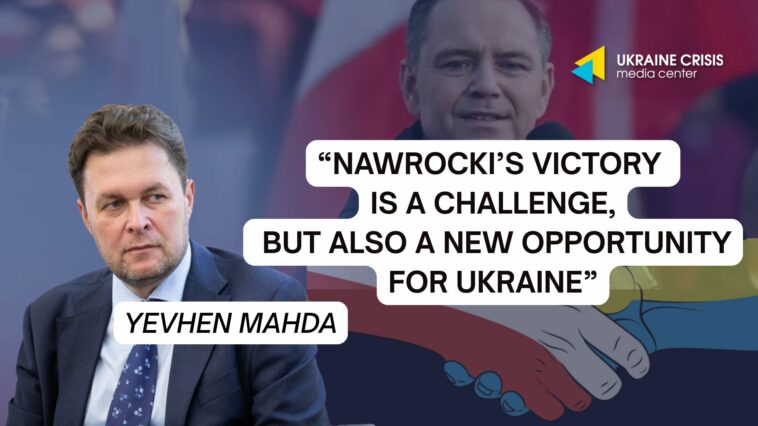Poland has recently elected a new president – Karol Nawrocki, a representative of the conservative Law and Justice party. His political platform envisions a tougher stance towards Ukraine, particularly regarding Euro-Atlantic integration and historical memory policy.
This raises a number of questions concerning the future of Polish-Ukrainian relations, which – despite some cooling at the present stage – remain an important element of regional security.
To discuss this topic, we spoke with Yevhen Mahda, associate professor, political analist and director of the Institute of World Policy.
Mr. Mahda, in your opinion, how might Karol Nawrocki’s presidency affect the dynamics of Polish-Ukrainian relations?
I believe it is a challenge. But therein lies the positive side — new opportunities arise.
Since the spring of 2023, Polish-Ukrainian relations have been slowly drifting from the close alignment that was built in the early days of the full-scale invasion. At present, we are already nearing the risk of bilateral deterioration.
During Nawrocki’s presidency, issues of historical policy will clearly be voiced more sharply. Some concern is also raised by Nawrocki’s signing of the so-called “Mentzen Declaration” ahead of the second round of the elections – though I would not overestimate its impact.
At the same time, in the economic dimension, the relationship is developing quite dynamically. Bilateral trade turnover last year reached $11.7 billion – higher than before the Russian invasion in 2022. However, the balance favors Warsaw, as the negative trade balance for Ukraine is growing.
What steps, in your view, should the Ukrainian side take to establish communication with Poland’s new president?
Ukraine has approximately two months to shape a renewed agenda for Polish-Ukrainian relations, taking into account the election results.
What, in my view, should be the priorities for Ukraine? Firstly, the dynamics of bilateral relations will be shaped by progress on opening the first cluster of Ukraine’s EU accession negotiations. Prime Minister Donald Tusk’s statement that he was among the initiators of suspending the EU-Ukraine trade visa-free regime, in my opinion, was part of the electoral campaign – an attempt to attract Ukraine-skeptical voters and secure their support for Rafał Trzaskowski. In the end, this did not help the ruling party’s candidate to swing the balance in his favor.
Secondly, it should be kept in mind that before Nawrocki officially takes office, the anniversary of the Volhynia tragedy will be commemorated. I am confident that the newly elected president will take an active role in the associated events. However, the tension surrounding this issue can be mitigated if Kyiv and Warsaw agree on new sites for exhumation. This is entirely achievable. We already have a positive example of the exhumation in Puzhnyky, which should clearly be continued.
I also believe that Ukraine should raise the issue of a new bilateral treaty. The current Treaty between the Republic of Poland and Ukraine on good neighbourliness, friendly relations and cooperation was signed back in 1992. It objectively reflects the fact that Poland was the first country to recognize Ukraine as an independent state. However, I think such documents should be updated every 30 years.
In addition, an important initiative could be to reinvigorate work within the Lublin Triangle format. This is a key element of regional security that requires further practical development. Incidentally, the Lithuanian-Polish-Ukrainian Brigade plays an important role in this context.
The Lithuanian-Polish-Ukrainian Brigade is involved in training units of Ukraine’s Defense Forces according to NATO standards. Source: armyinform
Could the issue of Ukraine become a factor in internal political confrontation between Prime Minister Tusk’s government and the newly elected president?
Unfortunately, during the presidential campaign, Ukraine “recieved” the role of a scapegoat. There is a logical explanation for this: the number of former Ukrainian citizens who have obtained Polish passports does not exceed 100,000 – exactly the number of signatures required to nominate a presidential candidate. In other words, former Ukrainian citizens cannot field their own presidential candidate.
Political competition will certainly take place between Tusk and Nawrocki. I hope it will not manifest as a contest to see who can hurt Ukrainians more. This concerns around two million Ukrainian labor migrants and refugees who currently live and work in Poland. At the same time, I am not aware of any case in recent years where a Polish citizen was dismissed in favor of a Ukrainian one. This simply does not happen.
In my view, Ukrainians in Poland present a challenge for the local establishment, as they represent a significant national minority without political rights.
Accordingly, we must become more proactive in this regard. This means that, in addition to shaping a policy of return for its own citizens, Ukraine should more actively protect the interests of Ukrainians in other EU countries – especially in Poland.

